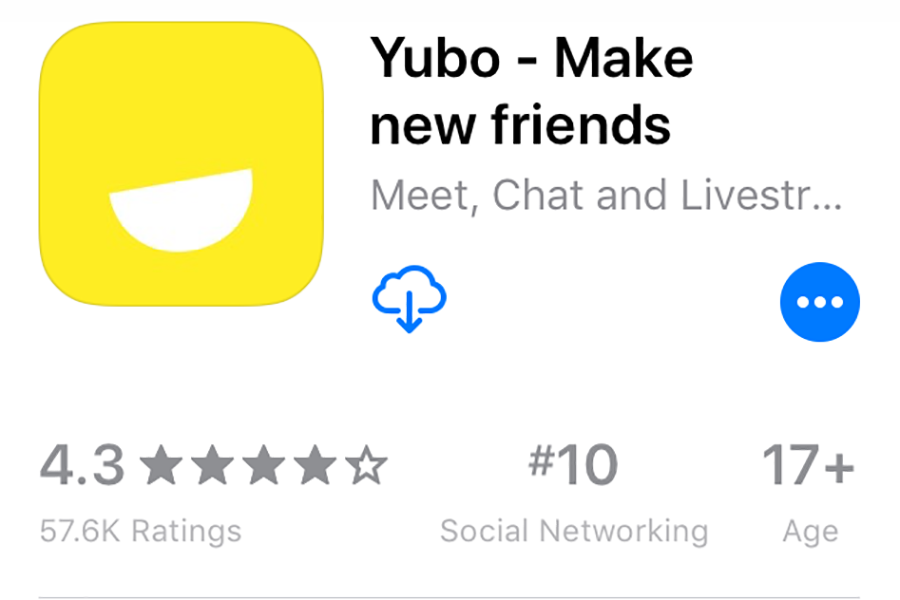The story behind Yubo: Tinder for teens unraveled
Bff is practically bf, right? Yubo is marketed as a forum for making friends, but is it really used for that?
Laden with innocence, the name “Yubo” could belong to a family-friendly cartoon or a plush stuffed animal. Attached to the name is an icon that exudes warmth. A white semicircle sits atop a yellow backdrop, and if you look at this geometric configuration for long enough it begins to form a cutesie, half-cocked smile. Yubo has been branded for the public as simple, fun, innocuous. But these things are simply a veneer concealing a messy reality.
Yubo, an app developed by the French company, Twelve APP, is marketed under the guise of a forum for teens to make friends worldwide. On the App Store, Yubo is advertised as a place where you can “livestream with like-minded people” and “chat with your new bff.” In every picture, people are either grinning or smizing, grinning or smizing, smizing or grinning. In an example text chat, a user named Lil says, “Haha you’re crazy guys” with a quirky little crazy-eyed, tongue-out emoji, to which another user named Jake responds, “Mia you’re my queen.” The advertisement is a projection of an online utopia where people only talk in one-liners and always use the correct form of “your and you’re” (inconceivable!). Welcome to Yubo — a place where human interaction is never painfully awkward.
This seems perfectly fine on first inspection. However, it does not take long for the average internet-goer to recognize Yubo’s parallels to the dating app, Tinder. In fact, Yubo’s swipe feature suggests that this similarity is far from a coincidence, which is a point of controversy that has plagued the app since its inception.
“Most of the time you just find people who want to hook up,” Xio Moran ‘21 said.
The “swipe feature” is simply a manner of culling, separating the grain from the chaff, if you will. Users sift through the photos randomly presented to them, swiping right on those that please them and swiping left on those that fail to make the cut. If both users pass each other’s 10-second assessment, they are matched, allowing them to engage in conversation and photo-sharing.
Even the Tinder and Yubo icons share eerie similarities. The apps are both identified by white shapes, Yubo’s semicircle and Tinder’s flame, in front of a bright background. Much less risqué, the semicircle is Yubo’s neutered Tinder flame.
Although Yubo is somewhat of a teen Tinder by design, relatively few Yubo encounters evolve into relationships, or even real-life interaction. Instead, teens go on the app to receive affirmation.
“People are just on the app to tell you if you’re pretty or not. It’s kind of addictive to get compliments,” Eunice Kang ‘21 said.
To understand Yubo better, I decided to venture into the perilous realm of this teenage Tinder myself. Here I will disclose the records of my travels.
Something that immediately caught my attention was that there was no way of ensuring that the people I chatted with were the ages they said they were. The app does ask for your date of birth when you are registering, but I imagine this does little to deter predators. Also, there is nothing to prohibit users from stocking their profiles with photos that are not their own.
But I did not come across any predators (at least none that I knew of). Instead, I was greeted by a plethora of socially inept teenagers. I will admit, there are some interesting characters on this app, such as Georgius V, a vampiric goth who proclaimed in his bio that he is “aware of the effect [he] ha[s] on women.” Or Jasper, an Instagram model from Sweden who warned that he would probably not reply unless you were “super hot” (much to my chagrin, I did not receive a response). Or Wyatt of Wyoming, who, aside from having superb alliteration, was “just looking for a country girl,” and was greatly disappointed when he realized that I was a mere urban poser with a penchant for western attire and could not, in fact, two-step. (It’s not cultural appropriation, Wyatt. Cowboy boots are just cute, no matter if you’re in rural Wyoming or Downtown Los Angeles.)
Most of my matches were not as memorable as these three, though. Most were average teenagers looking for one thing, and one thing only: nude photos. These conversations usually lasted three minutes at most.
—Wyd rn? (for boomers, this translates to “What are you doing right now?”) — Oh I’m just chillin (my attempt at using the abbreviated vernacular of my more socially aware peers) — Chilling where? — In my room — I wish I could be there so I could #%&%@#!*&%–
Oh.
What I discovered is that even though I felt like my soul was slowly withering away each time I started swiping, once I started, I couldn’t stop. Even though I felt gross when I finally pried my fingers from my phone to take a break, for hours after I would continue to think about the app, about the 10 different conversations I had going, about all the potential matches that could be made. Every time my phone buzzed, anything occupying my mind at that second evaporated into the ether as I lunged for my little electronic validation box, breathlessly anticipating whatever Brendon or Braxton or Braden had to say. Suffice it to say that if Yubo was Pavlov, I was the dog. An insatiable hunger for dopamine in my little reptilian brain took over my higher consciousness, and I couldn’t stop until I finally deleted the app from my phone. I’m surprised I didn’t experience tremors.
Yubo is yet another extension of Gen Z’s endless quest for likes and followers. The interactions on the app lack intimacy, but they runneth over with superficial validation. If Troy from Mississippi says, “aye ur hot,” you’ll get to revel in the satisfaction of knowing that someone finds you pretty, but five minutes later you’ll be onto Jason from Delaware who says “damn ur fine.” You’ll never love Troy. You’ll never love Jason. But as long as you allow their flattery to fill a void in your heart, you’ll keep coming back for more.

Ella Kitt is the editor-in-chief. She joined the Veritas Shield writing staff as a sophomore in 2018 and served as the managing editor her junior year....

